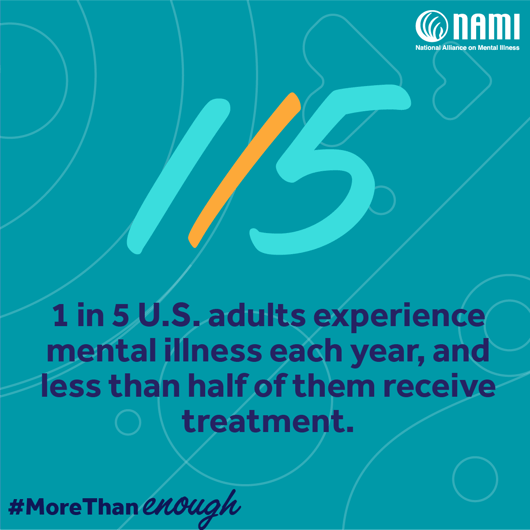Health Tips in Honor of Mental Health Awareness Month
- Category: General, Mental Health
- Posted On:
- Written By: Boulder Community Health

May is Mental Health Awareness Month. This year, the National Alliance on Mental Illness (NAMI) is celebrating the annual observance with the More Than Enough campaign. Raising awareness about mental health is vital to fighting stigma, providing support, and educating our communities. More Than Enough reminds us that we belong and neuro-diversity is something to celebrate and support.
 Across the country, there is a growing need for mental health support. One in five U.S. adults experience mental health needs each year. In Colorado alone, 924,000 adults have a mental health condition. That’s more than 8X the population of Boulder.
Across the country, there is a growing need for mental health support. One in five U.S. adults experience mental health needs each year. In Colorado alone, 924,000 adults have a mental health condition. That’s more than 8X the population of Boulder.
Unmet mental health needs can impact quality of life and lead to changes in ability, unemployment, substance use, homelessness, inappropriate incarceration and suicidality.
Mental illnesses include many different conditions that vary in degree of severity, ranging from mild to moderate to severe. Whether you or someone you love is experiencing anxiety, depression, a mood disorder or thoughts of suicide, help is near.
In honor of Mental Health Awareness Month, we asked our experienced providers within BCH’s Behavioral Health Services for their favorite mental health tips. Here is what they had to say about taking care of your mental health needs.
Self-Soothe Skills
“Practice grounding. Engage your five senses (touch, sight, hearing, smell and taste) to downregulate yourself in moments of overwhelm.”
Amanda Wroblewski, LCSW
PILLAR Program Coordinator
“One of the foundational elements of our Pathways program is that we take people out on hiking trails around Boulder to do our therapy. We have research that shows that it’s good for mental health to be out in pretty places and there are actual chemicals that get released from plants and trees that can calm us and lift our mood. Enjoy the lovely spaces.”
Mike Lewis, LCSW
Manager, Outpatient Behavioral Health Services
Relax Your Nervous System
“Decrease stress and anxiety by stimulating the vagus nerve. The vagus nerve is the main nerve of the parasympathetic nervous system - which controls mood, heart rate and immune response. The vagus nerve can be stimulated by placing an ice pack on your face and eyes or the back of your neck, singing out loud and proud, or having a good belly laugh. We don’t need a reason to laugh. Laughter Yoga starts with an intentional laugh, which leads to infectious laughter and an immune response in a matter of minutes.”
Sarah Wise, RN
Director of Nursing for Behavioral Health Services
“A great tool for moving out of the Freeze Trauma Response is shaking and dancing. Turn on some percussion music and shake your body with abandon for about five minutes. Then be still for two minutes and listen to all of the sensations in the body, with your eyes closed. Sense the whole body from top to bottom. Then put on a catchy tune and dance your heart out. Your nervous system will respond immediately as long as you listen to your body with kindness and refuse to be self-critical.”
Elizabeth Hasselwood, RN, BFA, certified Trager® practitioner
Center for Mind Body Medicine
Breathing Exercises
“If you find yourself feeling anxious or nervous or stressed out, check in with your body. You’ll notice you might be breathing very shallow. One of the things you can do to counteract fight or flight response is some deep breathing. Basically, you want to fill up your whole lungs. One of the terms we use is belly breathing. You can put one hand on your belly, and when you breathe in, you want to feel your belly expand first, then come up into your chest. If you do a deep breathing exercise for about five to 10 minutes, you’ll notice a difference.”
Mike Lewis, LCSW
Manager, Outpatient Behavioral Health Services
“I really like 4-7-8 breathing (inhale 4 seconds, hold 7 seconds, exhale 8 seconds, repeat) or box 5 breathing (inhale 5 seconds, hold 5 seconds, exhale 5 seconds, hold 5 seconds, repeat) for in the moment body calming.”
Taylor Bister, LSW
PILLAR Patient Navigator
“Every time you take a slow deep breath, or you turn toward body sensations, you are firing parasympathetic neurons. When these types of simple exercises are practiced regularly throughout the day (not just when you are emotionally distressed), you are firing parasympathetic neurons over and over again. Neurons that fire together, wire together. You are literally building a stronger parasympathetic nervous system. Your autonomic nervous system begins running in a better sympathetic/parasympathetic balance, all the time. This is no different than your bicep muscles getting stronger if you do bicep curls a few times a week.”
Brad Fanestil, MD
Medical Director, Center for Mind Body Medicine
Behavioral Health Services at BCH
BCH is a “Behavioral Health Home” where members of our community – with mental health issues ranging from simple to complex to chronic – can find appropriate and meaningful care. All in person Mental Health Treatment is provided at Della Cava Family Medical Pavillion in Boulder.
Learn more here.
In Need of Immediate Support?
- Community members who don’t feel safe or are in crisis can visit Foothills Hospital’s Emergency Department (ED) for a voluntary psychiatric evaluation. Licensed professionals will complete a comprehensive psychiatric evaluation and ensure all people are referred to the appropriate level of care.
- Contact the State of Colorado's crisis line at 1-844-493-8255 or text "TALK" to 38255 for 24/7 assistance.